A powerful earthquake rocked Myanmar and neighboring Thailand yesterday, killing at least three people in Bangkok and burying dozens when a high-rise building under construction collapsed. Footage shared on social media from Myanmar’s second-largest city showed widespread destruction, raising fears that many were trapped under the rubble or killed.
The magnitude 7.7 earthquake, with an epicenter near Mandalay in Myanmar, struck at midday and was followed by a strong magnitude 6.4 aftershock.
The extent of death, injury and destruction — especially in Myanmar, which is embroiled in a civil war and where information is tightly controlled at the best of times — was not yet clear.

Photo: Bloomberg
Myanmar’s government said blood was in high demand in the hardest-hit areas. Images of buckled and cracked roads and damaged highways as well as the collapse of a bridge and dam raised further concerns about how rescuers would even reach some areas in a country already enduring a widespread humanitarian crisis.
Near Bangkok’s popular Chatuchak market, a 33-story building under construction, with a crane on top, crumpled into a cloud of dust, and onlookers could be seen screaming and running in a video posted on social media.
The sound of sirens echoed throughout central Bangkok and vehicles filled the streets, leaving some of the city’s already congested streets gridlocked. The elevated rapid transit system and subway were shut down.
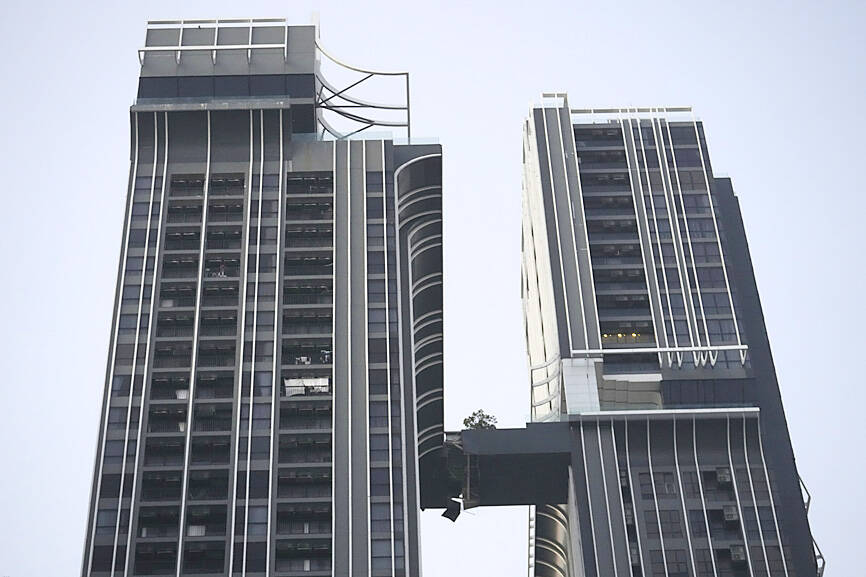
Photo: AP
While the area where the quake struck is prone to earthquakes, they are usually not so big and it is rare for them to be felt in the Thai capital.
In Bangkok, a construction worker was killed when rubble from the collapsing building site hit his truck and another was crushed by the falling debris, rescue worker Songwut Wangpon said.
Thai Minister of Defense Phumtham Wechayachai said three people were killed at the site and 90 were missing. He offered no more details about the ongoing rescue efforts, but first responders said that seven people had been rescued so far from the area.
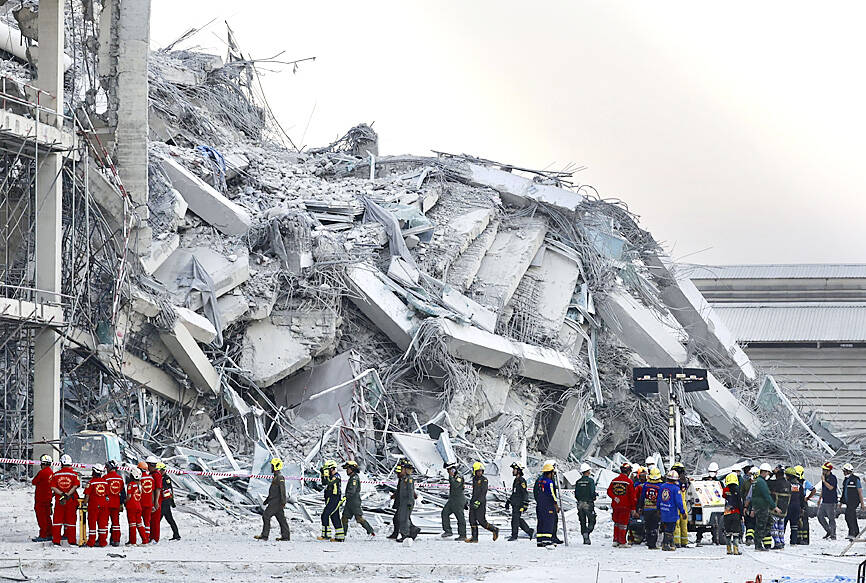
Photo: AP
In Taipei, President William Lai (賴清德) wrote on Facebook that he has asked the Ministry of Foreign Affairs to contact its offices in Myanmar and Thailand to look into the extent of the damage and see whether any Taiwanese would require assistance.
Lai said he is praying that there would be minimal damage in both countries, adding that if necessary, Taiwan would be willing to provide assistance.
Taiwanese nationals in Myanmar can call 209-257-257-575, and those in Thailand can call 081-666-4006 for assistance, Lai said.
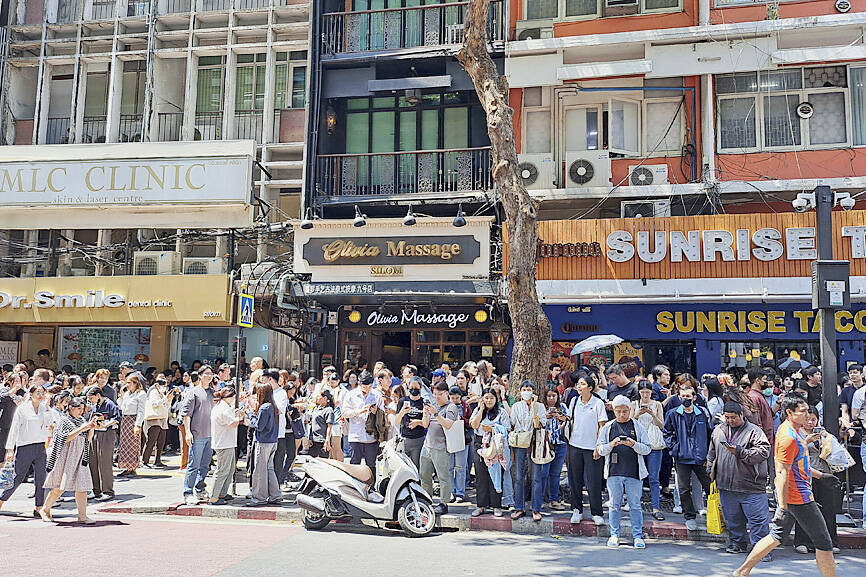
Photo: AP
The Ministry of the Interior said that the National Fire Agency’s Special Search and Rescue team is on standby to travel to the countries to help out with the rescue effort.
The teams comprise of 120 search and rescue personnel, including five doctors, one veterinarian, seven nurses, six search and rescue dogs, and 15 tonnes of disaster relief equipment, it said.
Kaohsiung Mayor Chen Chi-mai (陳其邁) said the city is prepared to deploy its disaster response team, as Kaohsiung has six disaster search and rescue dogs that have received International Rescue Dog Organization (IRO) certification, and the city this month is the designated city for overseas rescue dog deployment.
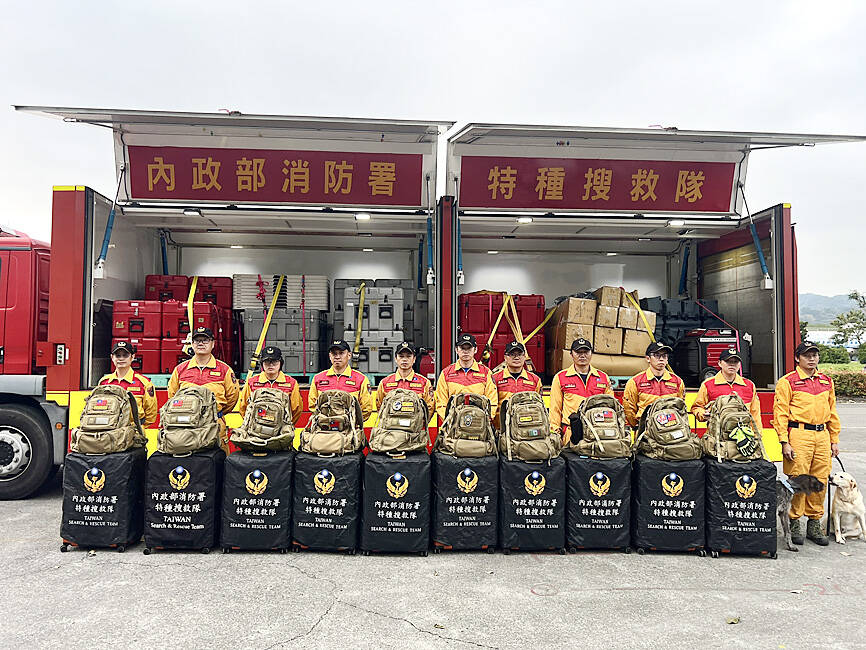
Photo: Screen grab from the National Fire Agency’s Facebook page
Meanwhile, the Shin Kong Wu Ho Su Memorial Hospital said it would donate US$100,000 to support disaster relief efforts in Myanmar.
Additional reporting by Su Yung-yao, Wang Jung-hsiang and Chiu Chih-jou
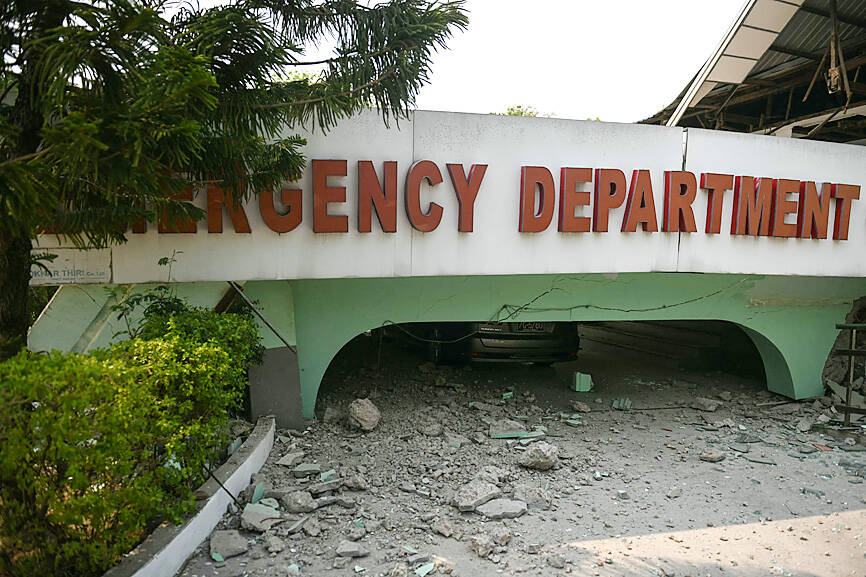
Photo: AP

Right-wing political scientist Laura Fernandez on Sunday won Costa Rica’s presidential election by a landslide, after promising to crack down on rising violence linked to the cocaine trade. Fernandez’s nearest rival, economist Alvaro Ramos, conceded defeat as results showed the ruling party far exceeding the threshold of 40 percent needed to avoid a runoff. With 94 percent of polling stations counted, the political heir of outgoing Costa Rican President Rodrigo Chaves had captured 48.3 percent of the vote compared with Ramos’ 33.4 percent, the Supreme Electoral Tribunal said. As soon as the first results were announced, members of Fernandez’s Sovereign People’s Party

MORE RESPONSIBILITY: Draftees would be expected to fight alongside professional soldiers, likely requiring the transformation of some training brigades into combat units The armed forces are to start incorporating new conscripts into combined arms brigades this year to enhance combat readiness, the Executive Yuan’s latest policy report said. The new policy would affect Taiwanese men entering the military for their compulsory service, which was extended to one year under reforms by then-president Tsai Ing-wen (蔡英文) in 2022. The conscripts would be trained to operate machine guns, uncrewed aerial vehicles, anti-tank guided missile launchers and Stinger air defense systems, the report said, adding that the basic training would be lengthened to eight weeks. After basic training, conscripts would be sorted into infantry battalions that would take

GROWING AMBITIONS: The scale and tempo of the operations show that the Strait has become the core theater for China to expand its security interests, the report said Chinese military aircraft incursions around Taiwan have surged nearly 15-fold over the past five years, according to a report released yesterday by the Democratic Progressive Party’s (DPP) Department of China Affairs. Sorties in the Taiwan Strait were previously irregular, totaling 380 in 2020, but have since evolved into routine operations, the report showed. “This demonstrates that the Taiwan Strait has become both the starting point and testing ground for Beijing’s expansionist ambitions,” it said. Driven by military expansionism, China is systematically pursuing actions aimed at altering the regional “status quo,” the department said, adding that Taiwan represents the most critical link in China’s

EMERGING FIELDS: The Chinese president said that the two countries would explore cooperation in green technology, the digital economy and artificial intelligence Chinese President Xi Jinping (習近平) yesterday called for an “equal and orderly multipolar world” in the face of “unilateral bullying,” in an apparent jab at the US. Xi was speaking during talks in Beijing with Uruguayan President Yamandu Orsi, the first South American leader to visit China since US special forces captured then-Venezuelan president Nicolas Maduro last month — an operation that Beijing condemned as a violation of sovereignty. Orsi follows a slew of leaders to have visited China seeking to boost ties with the world’s second-largest economy to hedge against US President Donald Trump’s increasingly unpredictable administration. “The international situation is fraught